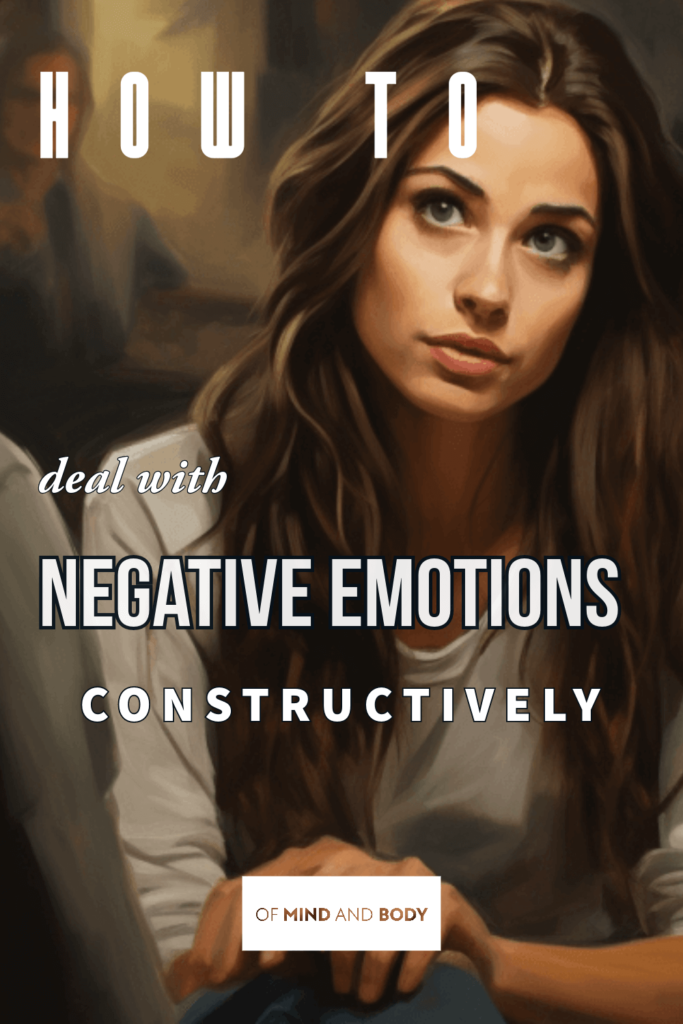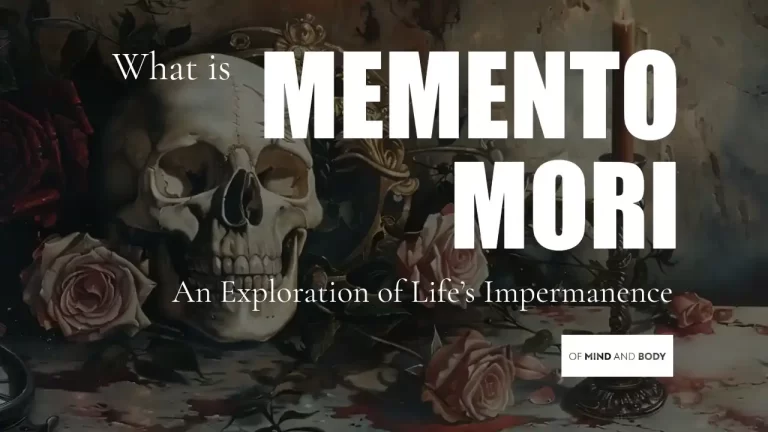
Life’s emotional landscape is nothing short of a roller-coaster ride. Picture this: one instant you’re soaring through the skies, basking in euphoria, and in the blink of an eye, you find yourself spiralling down into a chasm filled with negative emotions. It’s disorienting, to say the least. Yet, let’s pause and reconsider our perspective on these so-called “negative” emotions. Far from being the villains they’re often portrayed as, these emotions can serve as crucial milestones on your journey toward self–awareness and personal growth. Today, we’re not just scratching the surface; we’re diving deep into the labyrinth of our emotional selves. We’ll explore how to navigate through these complex feelings and channel them constructively to achieve a more harmonious and balanced state of being.
What Are Negative Emotions?

Think of negative emotions as the tempestuous weather patterns in the climate of your mind. Just as a thunderstorm brings rain, wind, and lightning, negative emotions come with their own set of complexities—anger, sadness, jealousy, and so forth. These emotional states are as natural as the changing weather; they’re an integral part of the human condition.
Often, these emotions may be viewed as “bad” or “undesirable,” casting them in a shadow of negativity. But it’s crucial to remember that these emotions aren’t malevolent forces out to ruin your day; they’re nuanced indicators of your psychological landscape. Rather than vilifying them or pushing them into the recesses of our minds, let’s take a more enlightened approach. Let’s delve into the multifaceted nature of these emotions, exploring their origins, their impact, and the lessons they bring.
By reframing our perspective, we can begin to see these so-called negative emotions not as hindrances but as valuable tools for self–discovery and growth. After all, understanding the intricate tapestry of our emotional selves is the first step towards a more balanced, fulfilling life.
Navigating the emotional landscape can be like manoeuvring through a maze. To better understand this intricate world, it’s crucial to identify and name the negative emotions we experience. Here’s a list to guide you:
– Anger
– Fear
– Jealousy
– Loneliness
– Guilt
– Shame
– Anxiety
– Sadness
– Frustration
– Disappointment
Each of these emotions serves as a signpost on your journey, offering both challenges and opportunities for personal growth.
The Underlying Triggers of Negative Emotions
Have you ever found yourself thinking about the complex web of your emotions? questioning why you’re engulfed in feelings you can’t quite put your finger on? At times, the culprit is as clear as day: unfulfilled desires. These aren’t just whims or fleeting wants; they’re profound yearnings for elements that make us fundamentally human—love, security, and sometimes, the exhilarating rush of adventure.
But let’s not overlook another significant factor: ineffective coping strategies. Those psychological defence mechanisms we so naively believe are our allies. In reality, they’re more like Trojan horses, seemingly beneficial but ultimately causing more harm than good. Whether it’s denial, projection, or even humour used inappropriately, these coping tactics can boomerang on us, exacerbating our emotional disarray rather than alleviating it.
So, the next time you find yourself in an emotional quagmire, take a moment to reflect. Could it be a yearning for something deeper that’s throwing you off balance? Maybe it’s time to take a second look at the ways you’re dealing with stress or problems, especially if they’re not really helping you.Understanding the root causes of your negative emotions is the first step in mastering them.
The Paradox of Negative Emotions: Should We Aim to Eradicate Them or Embrace Their Complexity?

Far from being arbitrary disruptions in our emotional landscape, negative emotions often act as agents of transformation. Think of them as the universe’s way of nudging us—sometimes rather forcefully—toward addressing unresolved matters or confronting uncomfortable truths. They’re the alarm bells of our psyche, signalling that something within us or around us requires our attention for personal evolution.
However, let’s not overlook the perilous path of emotional repression, a tactic many of us resort to when these unsettling feelings arise. Imagine trying to submerge a beach ball in a swimming pool. No matter how hard you push it down, it’s bound to resurface, often with a splash that catches you off guard. Similarly, suppressing your emotions is a futile endeavour. It’s akin to bottling up a tempest in a jar—sooner or later, the pressure builds up to a point where the jar can’t contain it anymore, leading to emotional eruptions that can be both unpredictable and damaging.
It’s also worth noting that what we often label as ‘negative emotions’ can sometimes be entirely reasonable responses to life’s challenges. Whether it’s the heartache from a relationship breakdown, the profound sadness from the loss of a loved one, or the anxiety stemming from job loss, these emotions are not only inevitable but also perfectly valid. They are natural reactions to the highs and lows of the human experience, serving as indicators that something significant has impacted your life. So, while it’s essential to manage these feelings constructively, it’s equally important to acknowledge their validity.
“Life is a comedy to those who think, a tragedy to those who feel.”
— Jean Racine
So, the question isn’t merely about eradicating negative emotions from our lives. It’s about learning to coexist with them, understanding their nuances, and harnessing their transformative potential. After all, it’s the rich tapestry of emotions—the interplay of light and shadow—that adds depth and texture to our human experience. Just as in a well-crafted painting, the contrast between dark and light hues brings out the details and adds dimension, so does the range of our emotions in life. They offer us a fuller, more nuanced experience of what it means to be human. And as Jean Racine so eloquently put it, our lives are both comedy and tragedy, a blend of highs and lows that make the journey all the more meaningful.
Unveiling the Effects of Negative Emotions
Negative emotions are far from being confined to the recesses of your mind; they reverberate through your entire existence like ripples in a pond after a stone is thrown. This ripple effect is more than just a metaphor; it’s a tangible phenomenon that can significantly alter your well-being.
Take emotional drain, for instance. It’s not just a fleeting feeling; it’s a form of mental exhaustion that can sap your cognitive resources. Over time, this fatigue can impair your decision-making abilities, cloud your judgement, and even lead to symptoms akin to burnout. It’s as if your mental battery is perpetually running low, making even simple tasks seem Herculean.
But the impact doesn’t stop at the mental level. Negative emotions also exact a physical toll, manifesting in a myriad of ways that can disrupt your bodily functions. You might experience headaches that no amount of over-the-counter medication can alleviate, or digestive issues that make even your favourite foods seem unappealing. In more severe cases, the stress hormones triggered by these emotions can lead to chronic conditions like hypertension and heart disease.
Further reading here and here.
So, when we talk about the effects of negative emotions, we’re not just discussing abstract feelings. We’re talking about a holistic experience that affects both mind and body, and unfortunately, it’s not the kind of holistic experience that promotes wellness or balance. It’s a wake-up call, signalling that something within us needs attention and care.
Unhealthy Ways to Cope with Negative Emotions

The allure of immediate gratification. Picture this: you’ve had a gruelling day, and all you want to do is drown your sorrows in a tub of mint chocolate chip ice cream. Or perhaps you’ve decided to lose yourself in a Netflix series, episode after episode, as if each click of the “Next” button could distance you from your emotional turmoil. These are classic examples of emotional eating and escapism.
But let’s pause for a moment and dissect what’s really happening here. Emotional eating is more than just a craving; it’s an attempt to fill an emotional void with sensory pleasure. The sweetness of the ice cream momentarily numbs the bitterness of your emotions. Similarly, escapism through binge-watching serves as a temporary portal to another world, far removed from your own challenges and disappointments.
While these coping mechanisms offer a fleeting sense of relief, they are merely palliative measures. Think of them as band-aids on a deep, festering wound. They cover the problem but don’t address the root cause. And the more you rely on these quick fixes, the more you risk spiralling into a cycle of emotional dependency. It’s akin to putting a leaky bucket under a dripping ceiling; it might catch the water, but it won’t fix the leak.
So, what’s the takeaway? These unhealthy coping strategies are not your allies in the quest for emotional well–being. They’re detours on your journey, leading you away from genuine healing and self–discovery. It’s crucial to recognise them for what they are: temporary distractions that delay the essential work of emotional mastery.
A Comprehensive Guide to Constructively Addressing Negative Emotions
Embarking on the journey to emotional liberation begins with acknowledging and taking full ownership of your feelings. This act alone can be a transformative experience, freeing you from the shackles of emotional turmoil. But that’s just the starting point. To truly gain mastery over your emotional life, you must also delve into the labyrinth of your inner needs. Recognising what fuels your emotions provides you with the roadmap to emotional well-being.
The Power of Emotional Accountability

Embracing responsibility for your emotions isn’t merely a catchy self-help slogan; it’s an empowering paradigm shift that aligns well with Stoic principles. When you cease attributing your emotional state to external factors or individuals, you regain control over your emotional landscape. This newfound autonomy inspired by Stoic-inspired self-governance equips you with the resilience and composure needed to sail through life’s tempests with equanimity.
“The chief task in life is simply this: to identify and separate matters so that I can say clearly to myself which are externals not under my control, and which have to do with the choices I actually control.”
-Epictetus
Decoding Your Emotional Needs
Understanding your needs goes beyond mere self-indulgence; it’s an integral part of self–awareness, a theme deeply explored in the article on values and beliefs. Whether you’re yearning for validation, love, or a sense of accomplishment, recognising these fundamental needs is like discovering the cornerstone of your emotional architecture. Establishing your values and beliefs acts as a compass, guiding you towards meeting these needs in a manner that aligns with your core principles. It’s not just about filling gaps; it’s about constructing a fulfilling life based on a well-defined ethical and emotional framework.
Crafting Your Emotional Toolkit
Once you’ve identified your emotional triggers and underlying needs, it’s time to assemble your toolkit for emotional well-being. This is where the rubber meets the road.
Journaling: The Written Mirror

Journaling transcends the simple act of jotting down thoughts; it serves as a reflective mirror, capturing the nuances of your emotional landscape. This written dialogue with yourself enables you to dissect complex emotions, offering a panoramic view of your inner world. It’s akin to having a candid conversation with your psyche, where you can identify triggers, question your reactions, and even challenge long-held beliefs. Over time, this practice can reveal recurring behavioural patterns, helping you understand not just how you react to certain situations, but also why. In essence, journaling becomes a transformative tool that fosters self-awareness and emotional intelligence, aligning perfectly with the quest to understand your needs and values.
Physical Exercise: The Body-Mind Connection
Exercise transcends the realm of mere physical fitness; it serves as a powerful catalyst for emotional equilibrium. When you engage in physical activity, your body releases endorphins, often referred to as “feel-good hormones.” These biochemical agents act as natural mood enhancers, lifting your spirits and infusing you with a sense of well-being. But the benefits don’t stop there. Exercise also offers a constructive channel for releasing pent-up emotions, transforming what might have been emotional volatility into kinetic energy. Whether it’s the rhythmic pounding of a run or the focused tranquillity of a yoga session, physical exercise allows you to connect with your emotional core in a visceral way. It’s a symbiotic relationship where the body and mind collaborate, each enhancing the other’s capacity for balance and resilience. This harmonious body-mind connection is not just a fleeting sensation but a sustainable pathway to emotional stability.
Mindfulness Practices: The Anchor in Emotional Storms

In the tempestuous seas of emotional upheaval, mindfulness practices act as your steadfast anchor, grounding you when waves of feelings threaten to toss you about. Techniques like deep breathing and meditation are more than just calming exercises; they are transformative practices that help you remain centred and balanced, even when navigating through emotional whirlwinds.
Deep breathing, for instance, is not merely an act of inhaling and exhaling; it’s a conscious effort to regulate your emotional state. By focusing on your breath, you create a mental space that allows you to observe your emotions without becoming entangled in them. It’s akin to finding a serene island in the midst of a stormy ocean.
Meditation, on the other hand, offers a deeper dive into your emotional landscape. It’s an opportunity to explore the recesses of your mind, to confront lingering thoughts and feelings that often fuel emotional unrest. Through consistent meditation, you cultivate a heightened sense of awareness, enabling you to recognise emotional triggers and patterns. This awareness is your first line of defence, equipping you with the tools to proactively manage your emotional state rather than react impulsively.
In essence, mindfulness practices like deep breathing and meditation serve as your emotional anchor, offering a stable foundation that allows you to face life’s ups and downs with equanimity and grace.
Social Support: The Power of Shared Experience and Emotional Resonance

Engaging in open dialogue with a trusted friend or family member can be a transformative experience, offering more than just a listening ear. It provides a fresh perspective, a new lens through which you can view your challenges, akin to stepping outside of yourself and observing your life from a different vantage point. But it’s not just about gaining new insights; it’s also about emotional relief, the kind that comes from feeling truly understood and less alone in your struggles.
The healing power of a heartfelt conversation is immeasurable. It’s like a balm for the soul, soothing emotional wounds and offering a sense of communal resilience. This shared experience can be a catalyst for emotional growth, reinforcing the Stoic principle that while we can’t control external events, we can control our reactions to them. In this safe space, you’re not just sharing words; you’re sharing emotional burdens, making them easier to carry.
Moreover, these conversations often serve as a mirror, reflecting your values and beliefs back to you. They can help you better understand your needs by aligning them with your core principles, making the path forward clearer and more in tune with your authentic self. So, never underestimate the profound impact that social support and shared experience can have on your emotional well-being.
By integrating these tools and practices into your daily life, you not only equip yourself to deal with negative emotions constructively but also pave the way for emotional resilience and well-being.
Conclusion
Embarking on the path to emotional well-being is akin to running a marathon, not a mere sprint. It’s a long-term commitment that requires patience, resilience, and a willingness to confront the complexities of your inner world. The beauty of this journey lies in its ability to enrich your life in ways you never imagined. By fully embracing the kaleidoscope of human emotions—from the euphoric highs to the challenging lows—you open yourself up to a life that’s not just lived, but deeply felt and profoundly understood.
You see, life’s richness doesn’t come from an endless string of happy moments; it comes from experiencing the full gamut of emotions and learning how to navigate them constructively.
Are you prepared to embark on the transformative odyssey towards emotional equilibrium? Imagine a future where you’re not just surviving, but thriving, emotionally balanced and resilient. Your future self will undoubtedly look back and appreciate the courageous step you took today. So let’s set sail on this enlightening voyage together, plumbing the profound depths of our emotional landscapes and aiming for an unparalleled state of mental and emotional serenity.

FAQs
Navigating the complexities of our emotional world often leaves us with questions that demand more than just surface-level answers. In this FAQ section, we delve into some of the most common queries about managing negative emotions, offering actionable insights grounded in mindfulness, stoicism, and Cognitive Behavioural Therapy.
How to Get Rid of Negative Feelings Towards Someone?
Firstly, delve into the underlying reasons for your negative feelings. Is it a past event, a misunderstanding, or perhaps a clash of values? Once you identify the root cause, the next step is to cultivate empathy. Put yourself in the other person’s shoes and try to understand their perspective. This doesn’t mean you have to agree with them, but understanding often diffuses negativity. If these steps don’t bring relief, it may be beneficial to consult a mental health professional. Therapy can offer a safe space to explore these feelings and develop constructive coping mechanisms.
Why am I So Negative and Unhappy?
The answer often lies in a complex interplay between external factors and your internal emotional landscape. External circumstances like work stress, relationship issues, or financial worries can contribute to a negative mindset. Internally, your thought patterns and cognitive biases could be perpetuating this negativity. A holistic approach to well-being, incorporating mindfulness, stoicism, and Cognitive Behavioural Therapy, can offer a comprehensive solution. It’s about tackling the issue from multiple angles to restore emotional equilibrium.
I’m Overwhelmed by Emotions: What’s My Next Move?
If you find yourself in emotional turmoil and are unable to navigate through it, professional guidance is often the most effective course of action. Therapists or counsellors can act as co-pilots on your journey towards emotional mastery, providing you with the tools and strategies to manage your emotional landscape effectively. Sometimes, the path to emotional well-being is not one to be walked alone; expert guidance can make all the difference.



